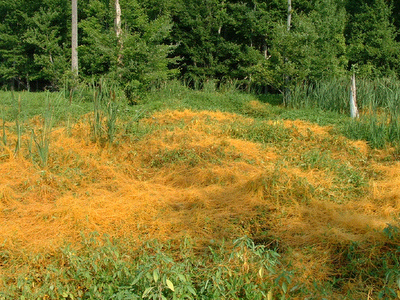Parasitic weed seems to smell its prey

By Aussiegirl
Good grief - plants may make choices! I'm a sucker (pardon the pun) for stories like this. Personally, I'd like to know if weeds deliberately camouflage themselves by growing next to desirable plants they resemble. Or is that just because they look similar that I fail to pull them before they get huge? Gardening is full of unanswered questions like these.
Parasitic weed seems to smell its prey - Yahoo! News
The parasitic dodder plant doesn't have a nose, but it knows how to sniff out its prey. The dodder attacks such plants as tomatoes, carrots, onions, citrus trees, cranberries, alfalfa and even flowers, and is a problem for farmers because chemicals that kill the pesky weed also damage the crops it feeds on.
So discovering how it finds its prey might help lead to a way to block the weed, or for crops to defend themselves, say researchers at Pennsylvania State University.
The question of how dodder finds a host plant has puzzled researchers. Many thought it simply grew in a random direction, with discovery of a plant to attack being a chance encounter.
But the researchers led by Consuelo M. De Moraes found that if they placed tomato plants near a germinating dodder, the parasite headed for the tomato 80 percent of the time.
And when they put scent chemicals from a tomato on rubber, 73 percent of the dodder seedlings headed that way.
"It opens a new avenue" for understanding parasitic plants, lead researcher Consuelo De Moraes said in a telephone interview.
Co-author Mark C. Mescher added, "One of the interesting things we found was that the plants make choices."
When they gave the dodder seedlings a choice between a tomato plant and a wheat plant, they preferred the tomato.
Dodder will infect wheat if there is no choice, he said, but they discovered that one of the volatile chemicals given off by wheat repels dodder, so it will choose the tomato if allowed to pick.
So, finding one compound that tends to be repellant could lead to ways to either treat crops to resist dodder or even engineer them to produce the compound themselves, Mescher said.


0 Comments:
Post a Comment
<< Home